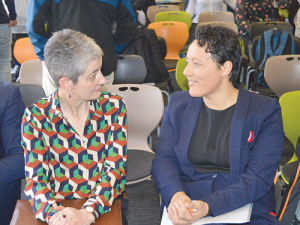Green no more?
OPINION: Your old mate has long dismissed the Greens as wooden bicycle enthusiasts with their heads in the clouds, but it looks like the ‘new Greens’ may actually be hard-nosed pragmatists when it comes to following voters.
 Labour MP Kiritapu Allan (right) with new MPI deputy director general policy and trade Penny Nelson at the ETS forum.
Labour MP Kiritapu Allan (right) with new MPI deputy director general policy and trade Penny Nelson at the ETS forum.
The Government says it will be important to set the right 2050 target in its Zero Carbon Bill.
Labour MP and primary production committee member Kiritapu Allan says the Government recognises the target has to be “something that everybody can get behind, live with and work towards achieving together”.
Speaking at a New Zealand Institute of Agriculture and Horticultural Science (NIAHS) forum in Wellington this month, Allan said the Government is looking for “an enduring consensus on this target to provide the certainty the sectors have been asking for”.
“With this Act we aim to be clear, honest and fair to farmers about what will be expected of them in the future.
“Everybody has a role to play in meeting these future targets. We need to work with farmers and the sectors to share best practice and support farmers through this transition.”
By means of the Zero Carbon Act, the Government will also set up an independent climate change commission in 2019 to advise on climate change issues. An interim climate change committee has been set up as a precursor and this is providing analysis on how surrender obligations could best be arranged if agricultural methane and nitrous oxide emissions enter into the NZ emissions trading scheme (ETS).
Allan says the committee will give evidence and analysis of the full range of policy options to reduce emissions from the agriculture sector.
“This will include, but is not limited to, the pricing of agricultural emissions in the NZ ETS.
“In providing their analysis and recommendations, the committee will consider the Government’s objective for a just transition.”
‘Just’ land-use transition
Labour MP Kiritapu Allan says the Government sees reducing NZs agricultural greenhouse gas emissions as an important and necessary step towards a productive, sustainable and inclusive economy.
Achieving this will require a just transition to more sustainable land use, she says.
“Farmers are facing demands to lower their greenhouse gas emissions and improve water quality, biodiversity, biosecurity and animal welfare outcomes.”
To align these objectives, various approaches and tools, such as a One Farm Plan and Overseer, are being developed and improved. This has opportunities for farmers and producers.
“An intensive, volume-driven growth model has created economic and environmental sustainability concerns.
“Continuing to grow wealth this way is no longer viable. By focussing instead on proving our strong environmental credentials, we can add value to our products and ensure their premium status. By diversifying and adding value, we can also boost our resilience and lessen exposure to swings from commodity prices.”
Following a side-by-side rolling into a gully, Safer Farms has issued a new Safety Alert.
Coming in at a year-end total at 3088 units, a rise of around 10% over the 2806 total for 2024, the signs are that the New Zealand farm machinery industry is turning the corner after a difficult couple of years.
New Zealand's animal health industry has a new tool addressing a long-standing sustainability issue.
The Government has announced that ACC will be a sponsor of this year's FMG Young Farmer of the Year competition.
As veterinary student numbers grow to help address New Zealand's national workforce shortge, Massey University's School of Veterinary Science is inviting more veterinary practices to partner in training the next generation of vets.
South Island dairy farmers will soon be able to supply organic milk to Fonterra.